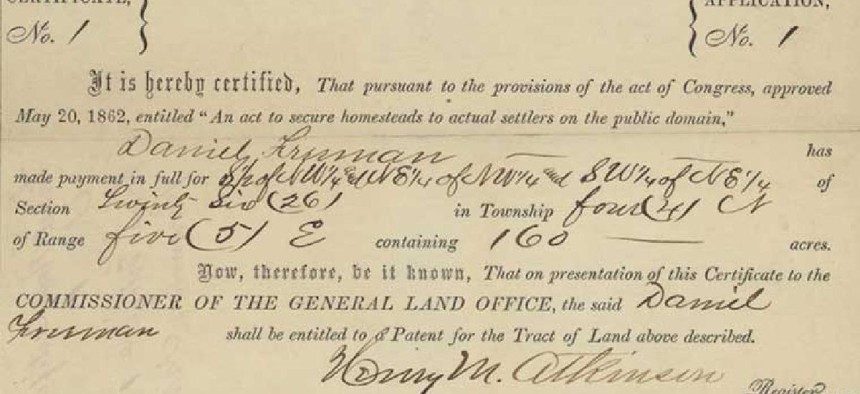Connecting state and local government leaders
The digitization and transcription of historical land records helps leverage the investment local governments have already made to store, maintain and make those records available to the public.
We recently celebrated Constitution Day, which provides a wonderful opportunity to celebrate the world’s oldest constitution still in force. Encased in glass and preserved with inert helium, the U.S. Constitution is a testament to how difficult but important it is to preserve the history that defines our identity. But there are millions more historical documents that make up our heritage and that for years have been locked away behind opaque bureaucratic structures and largely inaccessible storage formats. New digital technology is finally providing an easy, efficient and publicly accessible way to store and share this history.
All across the United States, local governments have been keeping track of land title ownership for centuries, dating in some places all the way back to before the establishment of the original British colonies.
This treasure trove of historical records has, of course, continued to grow over the centuries of American expansion. Local governments today store billions of pages of documents that can establish the historical chain of land ownership from the first royal land grants up to the most recent home purchase in 2020. Theoretically, every square inch of land in the conterminous United States has recorded evidence of ownership like this.
But there’s just one problem: Up until the early 1900s, all of these documents were handwritten in cursive by registrars, recorders and county, city and town clerks. The advent of typed text has since ended that practice, but centuries’ worth of handwritten historical records written on fragile paper must be maintained by government employees.
All this incurs significant labor, storage and maintenance costs for the vast majority of local governments today. And while many of these documents are pleasing to the eye, they are nearly impossible to decipher by most modern readers and cannot be easily searched. As a result, we’re at risk of losing easy, sustainable and efficient access to a huge part of our nation’s history.
Luckily, we can change that. Today, it’s possible to bring modern transcription practices to bear on these handwritten documents. A land records management system (LMRS) can capture, store, manage, search and retrieve scanned and transcribed handwritten documents. Here’s how it works.
Original handwritten documents are first scanned into digital images. These documents are then indexed so that the information related to each document can be uploaded into a database; the index values include information about the document such as the grantors, grantees, document number, recording date, book-and-page and document type. Once the documents are scanned and indexed, the individual pages are tagged, linked to the index and loaded into the LRMS. Once the historical documents are made ready through an LRMS, transcription makes them easily readable.
The scanned images are physically read by technical specialists with knowledge, experience and expertise who decipher each word in the original handwritten document, which are then physically keyed into a text file. This is essentially the same transcription process used by medical transcribers to type up doctors’ notes. This process is human-centric because there is no technology that allows for the automatic recognition of individual, handwritten words. Only a human can discern the differences between a cursive ‘S’ or ‘F.’ The LRMS gives the technical specialists the ability to view the typed text file next to a scanned image of the original, which can also be enhanced to improve readability.
Once the initial transcription is complete, a second operator samples the pages and conducts quality control to ensure that the typed text file is accurate and complete. The result is a typed text file that ‘duplicates’ the original document on a line-by-line basis. This makes it possible for anyone to read historical documents, facilitating public research of land title, genealogy and American history. The transcribed text files are also uploaded to the LRMS so that they can be searched and retrieved together with the original cursive-handwritten document.
The transcription of historical land records helps to leverage the investment that land recorders have made on an ongoing basis to store, maintain and make those records available to the public. With the LRMS, the practice of transcribing historical land evidence records has reached a new level of efficiency, transparency and ease.
That’s highly valuable service, allowing history buffs, researchers and genealogists to access, study and enjoy the wealth of historical information that local governments have been storing for centuries.



